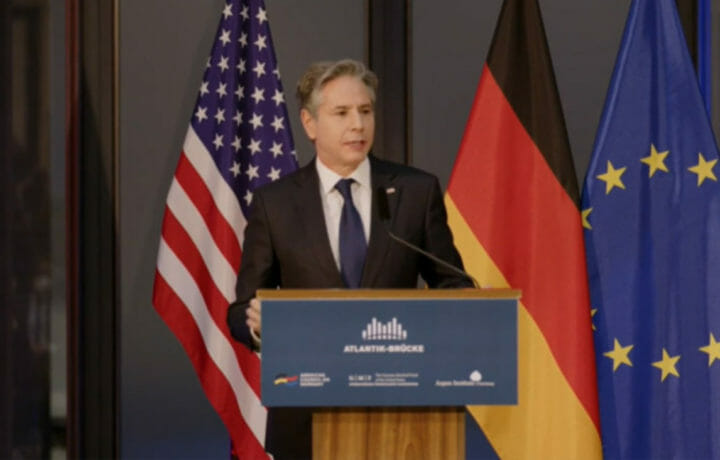Signed 82 years ago, the Molotov–Ribbentrop Pact was a non-aggression pact between Nazi Germany and the Soviet Union that enabled Hitler’s Germany and Stalin’s Russia to partition Poland. The pact guaranteed peace by each country towards each other along with a declaration that neither government would ally itself with or aid an enemy of the other. The pact was terminated on June 22, 1941, when Germany launched Operation Barbarossa and invaded the Soviet Union.
Now there is speculation that Germany might be the weak link in the Russia-Ukraine standoff as Berlin resists pressure from allies to deliver arms to Ukraine. Instead, Germany continues to urge for “prudence” when it comes to economic sanctions against Moscow.
As a variety of military support from NATO countries flow into the region, such as Danish F-16 fighters, Spanish ships, French troop commitment, the UK’s anti-tank weapons to Kyiv; and Monday night’s “alert” of 8,500 U.S. troops for the region, it appears Germany is slow moving on any military support efforts.
More to the Story than Meets the Eye?
It seems crazy that there could be anything to a story about Germany not being tough on Russian aggression. However, there have been several recent developments that make these concerns believable.
First, German Defense Minister Christine Lambrecht told Welt am Sonntag newspaper over the weekend that sending weapons to the Ukraine “will not help to defuse the crisis at the moment.” German Chancellor Olaf Scholz said Tuesday that Germany supports Ukraine’s economy and democracy, but not through the supply of arms.
Making matters worse, German Navy Chief Kay-Achim Schoenbach apologized for publicly stating Russian President Vladimir Putin deserved respect and Kyiv would never win back annexed Crimea from Moscow. As the Ukrainian Foreign Ministry called on Germany to publicly reject the navy chief’s remarks on January 22, the German government moved to distance itself from the comments.
Third, Berlin appears to be delaying fellow NATO members’ desires efforts to send their own arms to Ukraine. A German Defense Ministry spokesperson said it was “considering” a request from Estonia to send Kyiv howitzer artillery guns after a report that Berlin was blocking the shipment of the weapons, which used to belong to East Germany. They gave no likely timeline for a decision.
why would Germany slow roll military support efforts?
But why would Germany slow roll military support efforts? Could it be Germany guilt from the Second World War? Does this cause dissonance? Last week German Federal Minister for Foreign Affairs Annalena Baerbock, at a joint news conference with Russian counterpart, Sergey Lavrov in Moscow, acknowledged the “suffering and destruction that we Germans brought upon the peoples of the Soviet Union [during WWII]”. Some German scholars believe Germany’s role in WWII is a factor in Berlin’s decision-making, today.
Perhaps another factor is the German use of Russian resources. Germany relies on Russia for more than 30% of its natural gas. The percentage will increase when a multibillion-dollar pipeline, Nord Stream 2 is activated and pushes even more Russian gas to Germany this year. This must be on Berlin’s radar and a factor for their decision making.
Ukraine Applies Pressure
Desperate for any help they can receive from the West, the Ukraine is applying pressure everywhere. Last week the Ukrainian Foreign Minister Dmytro Kuleba stated in a tweet, “Ukraine is grateful to Germany for the support it has already provided since 2014, as well as for the diplomatic efforts to resolve the Russian-Ukrainian armed conflict. But Germany’s current statements are disappointing and run counter to that support and effort.”
The U.S. Position
This week, the White House came under fire for suggesting there maybe divisions within the trans-Atlantic alliance on the Ukrainian issue. However, restraint and the resignation of Navy Chief Schoenbach have not dissipated the idea that Germany may be the weak link.
The challenge is that Germany is a key NATO member. Berlin’s comments and actions make them appear ambivalent. Germany insists they are united with Western allies against Russian military action. Chancellor Scholz stated that if there was an invasion, NATO member states would act jointly, and Russia would pay a “high price.”
However, beyond rhetoric, many in the West believe Germany has not placed much skin in this game.



